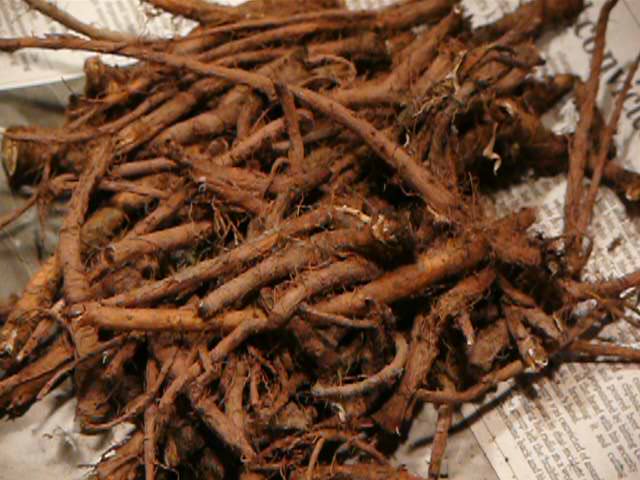A friend forwarded me an internet article which claimed that drinking dandelion tea can cure cancer. The article reported that a 72-year old leukaemia patient, who was sent home to live out his final days, found his cancer went into remission after four months of drinking dandelion root tea. My friend was intrigued by the anecdote and asked me for my opinion.

Use of dandelion in traditional medicine
I like dandelion root tea and I use dandelion extract as an important herb in my clinical practice. Dandelion is a common household weed that has been used as a traditional remedy in many cultures worldwide. In Western herbal medicine, dandelion root (Taraxacum officinale) is commonly used as a diuretic and a mild laxative indicated for digestive issues and constipation. It can also help to increase the production of bile from the liver and good for conditions such as gallstones, cholecystitis, and gall bladder dysfunction [1]. In Traditional Chinese Medicine, dandelion is known as Pugongyin (蒲公英), a mild (or some say cooling) herb that can “remove heat toxins, malignant swelling, breaks subcutaneous nodes, and eliminate food toxins” [2]. In Ayurveda, dandelion is called Simhadanti in Sanskrit. It is considered a bitter herb that stimulates digestion and a good remedy for kidney and liver disorders [3]. There is no doubt that dandelion is a valuable herb. Nonetheless, dandelion is considered a remedy more for the digestive system traditionally and there is hardly any mention of its use in cancer treatment.

Recent scientific evidence
Is there any scientific evidence supporting the claim that it can cure cancer? Research has shown that dandelion contains an array of phytochemicals with potentially healthful properties as shown in the following table [4]:
[table caption=”Phytochemical contents of Dandelion” ]
Phytochemical, Potential actions
Sesquiterpene lactones, anti-inflammatory and anticancer effects
Phenylpropanoids, inflammation-modulating effects
Terpenoids & polysaccharides, immune regulation; platelet antiaggregation activity; hepatoprotective effects; and antitumoral activity
Inulin, Potential immunostimulatory functions
[/table]
The phytochemicals within dandelion do possess certain anti-cancer effects. In fact, there are quite a number of research publications available on PubMed showing promising anti-cancer effects of dandelion extracts on different types of cancer cells. The anti-cancer effect of dandelion root extract was first reported by Japanese researchers more than 25 years ago [5]. Further research done by Koo et al indicated that dandelion extract can significantly induce the secretion of two types of antibodies (TNF-α and IL-1 α) that contribute to the cell death (apoptosis) of liver cancer cells (Hep G2 cells) [6]. More recently, the anti-cancer effects of dandelion have also been studied extensively by researchers from the University of Windsor in Ontario, Canada. They have demonstrated that dandelion extract can induce cell death in melanoma cells (skin cancer) [7], leukaemia cells[8,9] , pancreatic cancer cells [10], and colorectal cancer cells [11].
Such results have generated enormous interest in the potential use of dandelion extract as an anti-cancer agent. Most importantly, these studies also shown that dandelion extract is non-toxic to normal human cells. Hence, the researchers suggested that “Dandelion root extract could be a non-toxic and effective anti-cancer alternative, instrumental for reducing the occurrence of cancer cells drug-resistance.” [11]
Conclusion
Despite the promising results from these studies, it is still premature for anyone to claim that “Dandelion root extract is a cure for cancer”. Putting the results thus far into perspective, one should understand that they are all based on in vitro studies (i.e. studies using test tubes or culture dishes) and in vivo studies (i.e. studies using animal models). None of them is a human study. Thus, whether dandelion root extract can exert similar effects on the human body is still an unknown. Moving forward, human studies are needed to further confirm dandelion’s efficacy in cancer treatment. Therefore, I am not agreeable to those wild claims that touted dandelion is a “cancer cure”
Nevertheless, from natural therapy perspective, will I recommend cancer patient to drink dandelion root tea? Yes, I will. Since dandelion is known to be generally safe for consumption as food [12] and knowing that it may possess certain anti-cancer properties, it can be incorporated as a part of the diet for cancer patients. This can help to enhance their chance to fight cancer. A complementary therapy indeed it can be.

References
- K. Bone, The Ultimate Herbal Compendium, Phytotherapy Press, Warwick, QLD, 2007.
- J. Heo, Dongui Bogan – Treasured Mirror of Eastern Medicine, Chin Young, Seoul, Korea, 2013.
- SIMHADANTI, Dandelion = AYURVEDA HERBS, (n.d.). http://www.ayurveda-recipes.com/dandelion.html.
- M. González-Castejón, F. Visioli, A. Rodriguez-Casado, Diverse biological activities of dandelion, Nutr. Rev. 70 (2012) 534–547. doi:10.1111/j.1753-4887.2012.00509.x.
- K. Baba, S. Abe, D. Mizuno, [Antitumor activity of hot water extract of dandelion, Taraxacum officinale-correlation between antitumor activity and timing of administration (author’s transl)]., Yakugaku Zasshi. 101 (1981) 538–43. http://www.ncbi.nlm.nih.gov/pubmed/7310635 (accessed October 27, 2016).
- H.-N. Koo, S.-H. Hong, B.-K. Song, C.-H. Kim, Y.-H. Yoo, H.-M. Kim, Taraxacum officinale induces cytotoxicity through TNF-α and IL-1α secretion in Hep G2 cells, Life Sci. 74 (2004) 1149–1157. doi:10.1016/j.lfs.2003.07.030.
- S. Pandey, S.J. Chatterjee, P. Ovadje, M. Mousa, C. Hamm, The efficacy of dandelion root extract in inducing apoptosis in drug-resistant human melanoma cells, Evidence-Based Complement. Altern. Med. 2011 (2011). doi:10.1155/2011/129045.
- P. Ovadje, S. Chatterjee, C. Griffin, C. Tran, C. Hamm, S. Pandey, Selective induction of apoptosis through activation of caspase-8 in human leukemia cells (Jurkat) by dandelion root extract, J. Ethnopharmacol. 133 (2011) 86–91. doi:10.1016/j.jep.2010.09.005.
- P. Ovadje, C. Hamm, S. Pandey, Efficient induction of extrinsic cell death by dandelion root extract in human chronic Myelomonocytic Leukemia (CMML) cells, PLoS One. 7 (2012). doi:10.1371/journal.pone.0030604.
- P. Ovadje, M. Chochkeh, P. Akbari-Asl, C. Hamm, S. Pandey, Selective Induction of Apoptosis and Autophagy Through Treatment With Dandelion Root Extract in Human Pancreatic Cancer Cells, Pancreas. 41 (2012) 1039–1047. doi:10.1097/MPA.0b013e31824b22a2.
- O. Pamela, A. Saleem, J. Guerrero, A.J. Thor, Dandelion root extract affects colorectal cancer proliferation and survival through the activation of multiple death signalling pathways, Oncotarget. (2016).
- B. Sweeney, M. Vora, C. Ulbricht, E. Basch, Evidence-Based Systematic Review of Dandelion ( Taraxacum officinale ) by Natural Standard Research Collaboration, J. Herb. Pharmacother. 5 (2009) 79–93. doi:10.1080/J157v05n01_09.